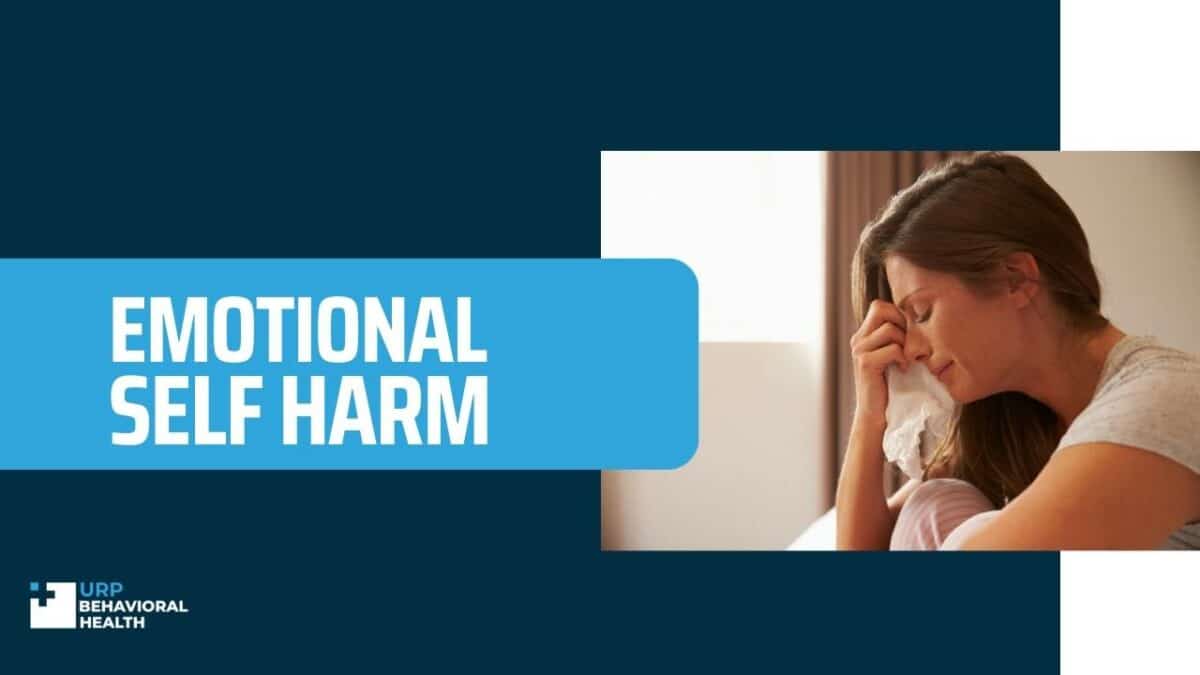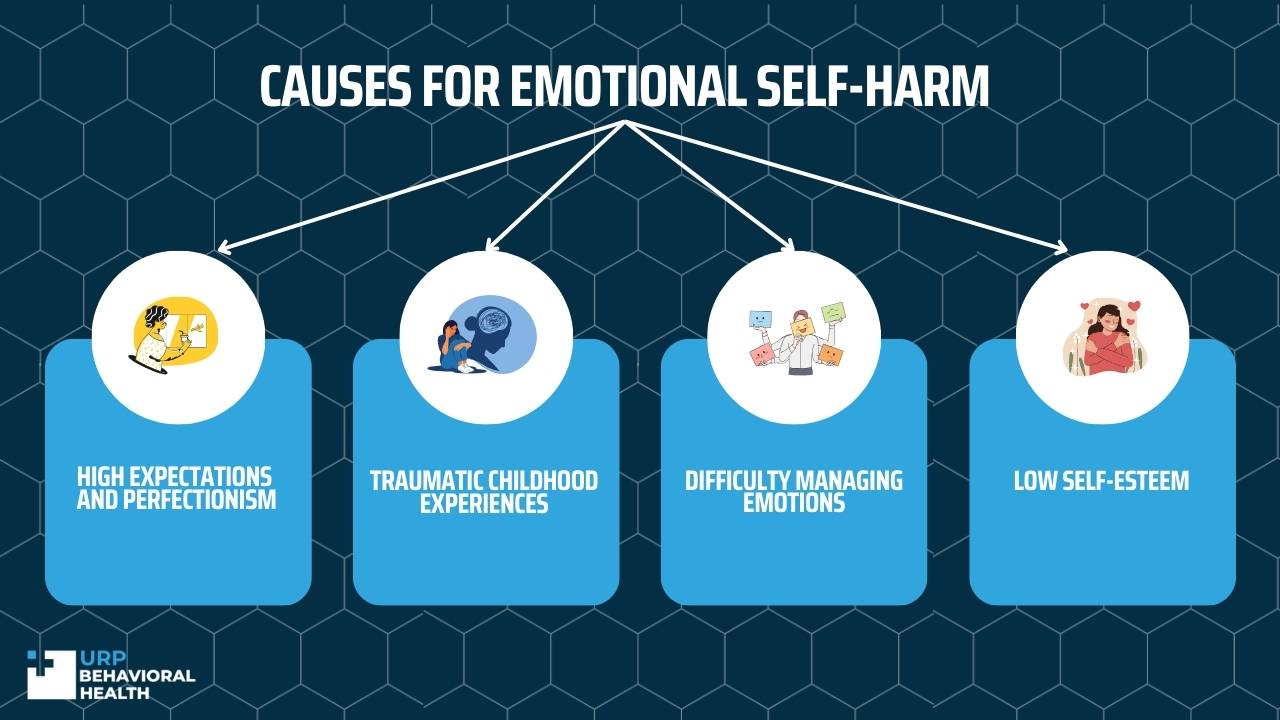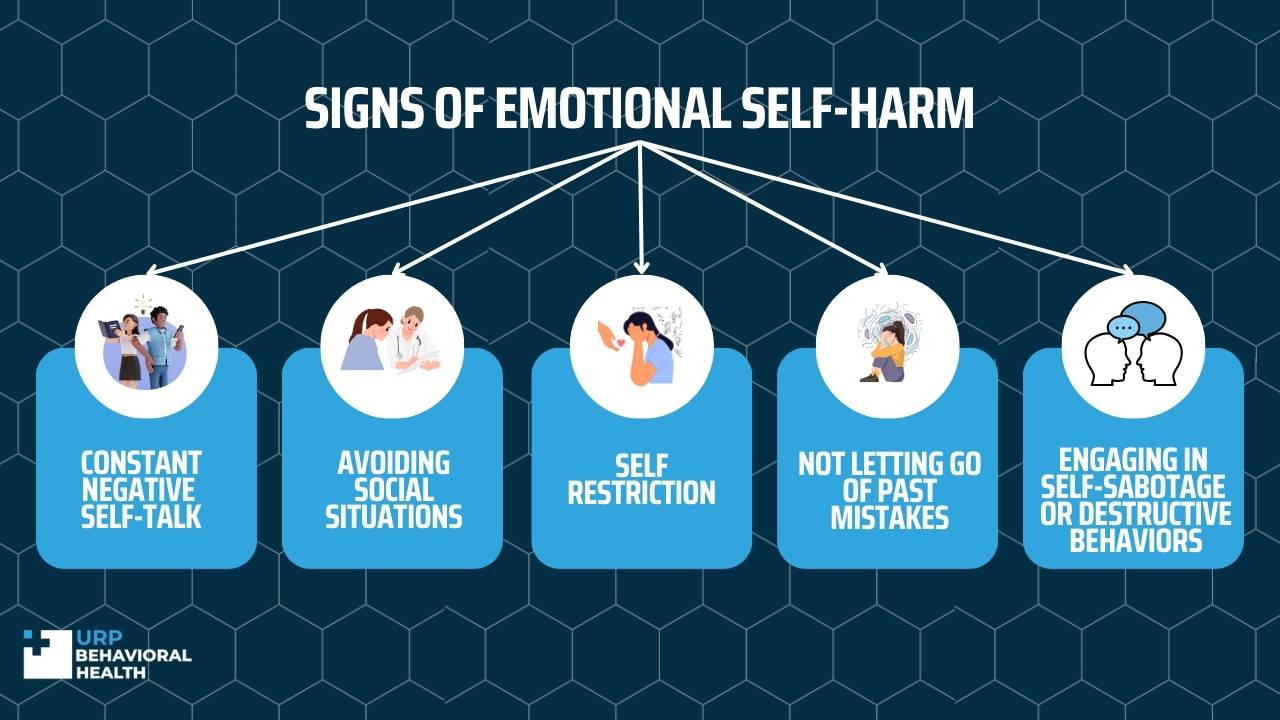Emotional Self Harm Treatment Center

Experts believe that as much as 23% of subjects in certain studies have engaged in some form of self-harm, with emotional self-harm being especially prevalent. Despite most people thinking that self-harm is exclusively physical, it can be emotional as well. Whether it is negative childhood experiences or difficulty managing emotions, many factors can contribute to this type of self-injury. This article will cover emotional self-harm, as well as the factors that cause it and its relevant treatments.

What is Emotional Self Harm?
Emotional self-harm refers to the intentional suffering, distress, and emotional pain that individuals cause themselves. It specifically focuses on negative thoughts and perceptions of oneself, which often result in destructive behaviors like social isolation or substance abuse. By harming their emotional well-being, self-esteem, and mental health, they can engage in even riskier behavior or start to engage in physical self-harm.

Causes for Emotional Self-Harm
High Expectations and Perfectionism
Studies suggest that there is a high correlation between perfectionism and self-harm. More specifically, individuals who are unable to meet high expectations of themselves might engage in emotional self-harm. They could have trouble moving on from past failures, or they might even engage in negative self-talk. Unfortunately, it is also likely that individuals transition to more serious forms of physical harm as a form of self-punishment or self-loathing.
Traumatic Childhood Experiences
Individuals with serious childhood neglect or experiences with abuse can engage in emotional self-harm. A systemic review found that self-harm was one of the most common ways that individuals with traumatic experiences in their childhood cope. Children can internalize their childhood emotional neglect and will often think that they are not good enough. They are also likely to reject help from family and friends, thinking that they do not deserve it.
Difficulty Managing Emotions
Emotional Self-harm and difficulty managing emotions can often cooccur, as individuals will have difficulty properly regulating their emotions. The outburst could be the result of feeling emotionally overwhelmed or thinking that they are being cornered. Individuals struggling with emotional self-harm will often disqualify the possibility of positive outcomes and only engage in black-and-white thinking. Outbursts can often lead to social isolation due to shame or guilt.
Low Self-esteem
Individuals with low self-esteem are more than likely to engage in emotional self-harm. Whether low self-esteem is the result of emotionally distant parents, academic difficulties, bullying, or even emotional abuse, it will often lead to emotional self-harm. Individuals with low self-esteem will often avoid social situations or distance themselves from friends and family, thinking that they do not deserve to be around them.

Signs and Symptoms of Emotional Self-Harm
Constant Negative Self-talk
While correcting oneself internally after making a mistake is not always a bad thing, negative self-talk can take on a much more concerning form. More specifically, individuals can sometimes yell at themselves in anger or ridicule themselves for even the smallest mistakes. Individuals are also likely to call themselves names like worthless or losers when engaging in negative self-talk. This can have an adverse effect on an individual’s sense of self-worth and can greatly reduce their self-esteem.
Avoiding Social Situations
Studies have found that individuals who avoid social situations likely do so as a result of emotional self-harm. Social withdrawal could be the result of self-punishment or due to shame. If they are unable to finish a certain task on time or do not achieve the desired result, they will often choose not to be in social situations with friends or family.
Self-Restriction
Self-punishment can take many forms, one of which is self-restrictions. Along with negative self-talk as a way of punishment, individuals can also restrict themselves from essential things that they need. They can stop themselves from going out to socialize, and in more severe cases, they can stop themselves from eating or sleeping. They will often set these boundaries until they can accomplish a task.
Not Letting Go of Past Mistakes
Another common sign of individuals struggling with emotional self-harm is that they will be unable to move on from past mistakes. They will either make assumptions about possibilities if they had made better decisions or will focus on making “should” statements. These are the two most common forms of cognitive distortions and can leave individuals in a repetitive cycle of grief. An inability to let go of past mistakes can also cloud judgment for present and future actions.
Engaging in Self-sabotage Or Destructive Behaviors
Finally, one of the most visible signs of emotional self-harm is that individuals self-sabotage or engage in destructive behaviors. Self-destructive behaviors are habits that individuals will often engage in despite knowing that they will be hurtful. This can include substance abuse, staying in abuse situations, or having unprotected sex. Even if they know that these habits are dangerous, they are more than likely to engage in them. Furthermore, these individuals are also likely to engage in self-sabotage, such as purposefully missing out on good business or career opportunities.
Treatment for Emotional Self-Harm
Cognitive Behavioral Therapy
According to recent studies, Cognitive Behavioral Therapy (CBT) is very effective at helping people manage their emotions. Along with significantly reduced instances of engaging in destructive behaviors, patients also saw their depressive symptoms subside and their self-esteem improve. By feeling like they deserve the affection of friends and family, social withdrawal is also greatly reduced. Therefore, CBT can be effective at helping individuals cope with self-harm, but to better process the emotions surrounding it.
Dialectical Behavioral Therapy
Studies also suggest that Dialectical Behavioral Therapy (DBT) can help reduce many emotional self-harming tendencies. Along with helping individuals better process their emotions, treatment also improved any depressive symptoms. However, DBT on its own is not a very effective strategy and is only effective when paired with CBT. The same study shows that DBT does not have a major effect on anger or suicidal ideation.
While often overlooked by most people, emotional self-harm is a very serious condition that requires serious attention. Fortunately, there are a multitude of ways that individuals can get treated for different types of emotional self-harm, as well as related mental health side effects.
Let us guide you towards healing
We know that seeking treatment can be overwhelming, but our staff is here to make the process as smooth as possible. We’re available 24/7 to address any questions or concerns you may have.

